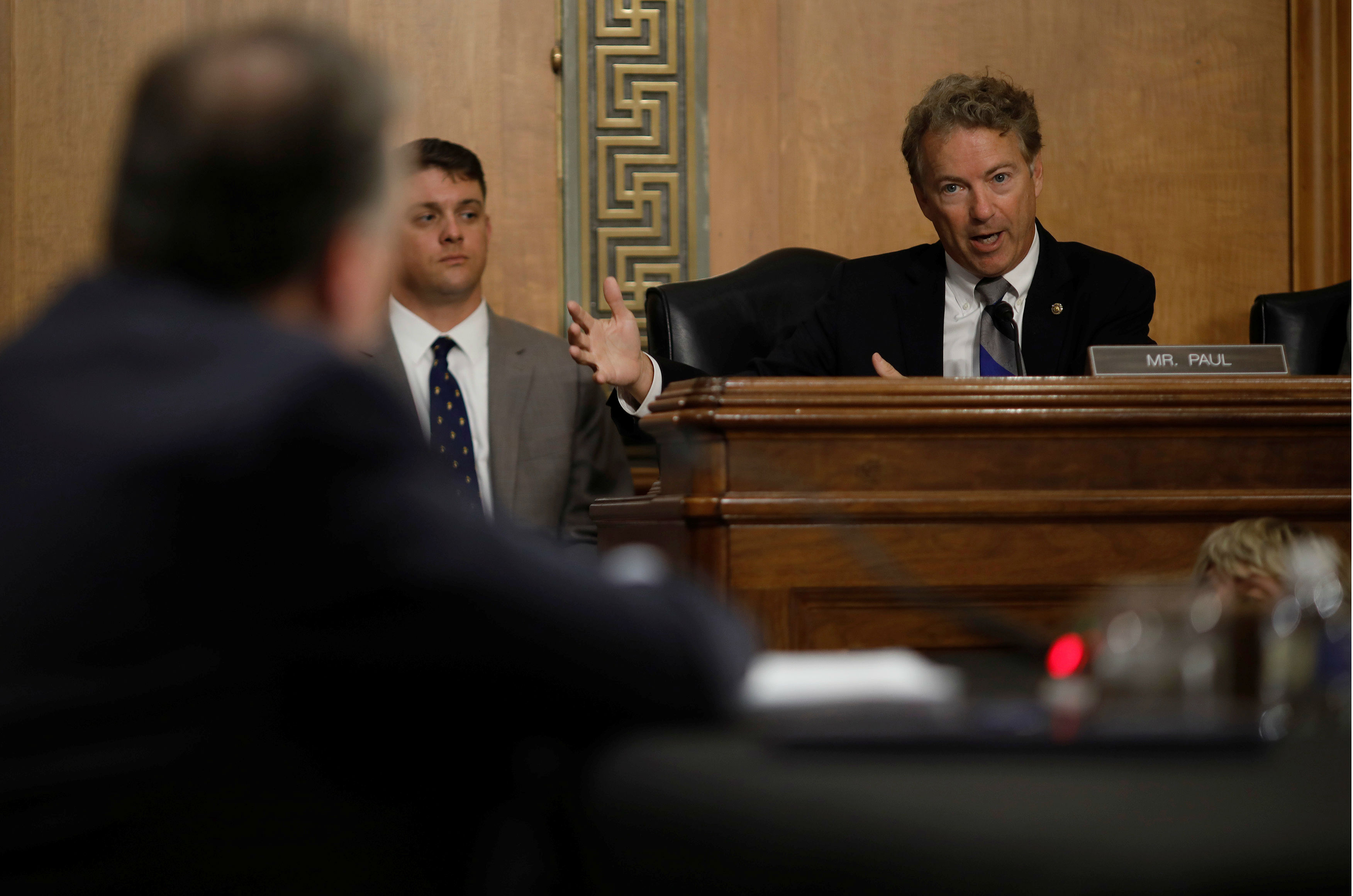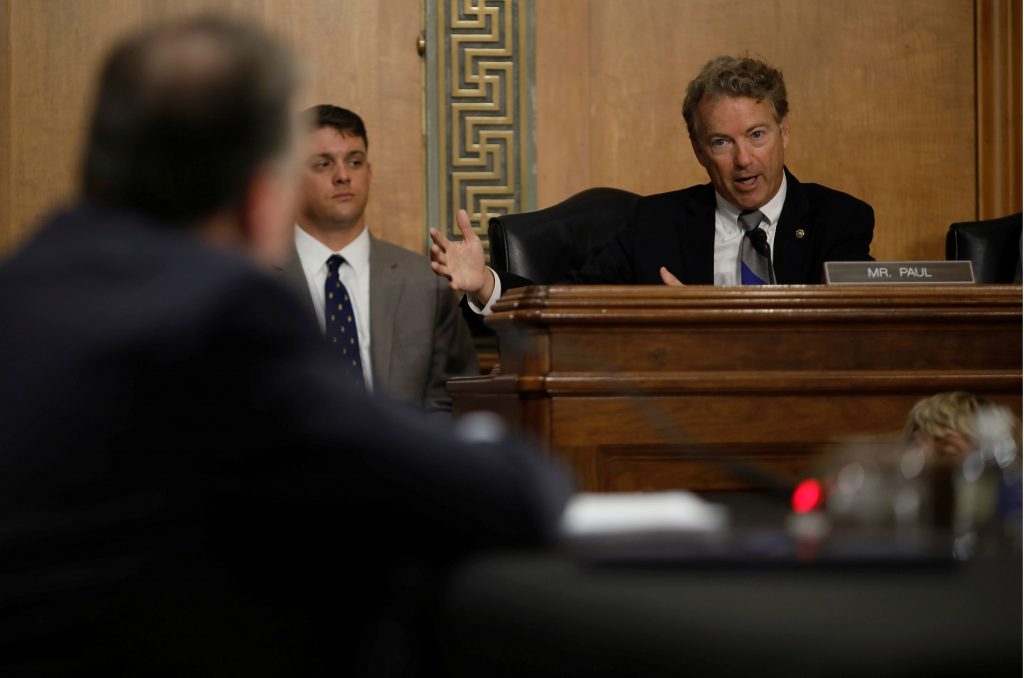 Three weeks ago, Republican Senator Rand Paul leapt to the defense of US President Donald Trump following fierce criticism over his comments at the July 16 press conference with Russian President Vladimir Putin in Helsinki. Known for his libertarian views, Paul urged the president to revoke the security clearances of former CIA director John Brennan and others who have criticized the president for his inaction related to the cyberattacks and disinformation campaigns directed by Russia’s intelligence agencies in the 2016 elections. While acknowledging that these took place, Paul also stated that the United States meddles in the elections of other countries, including in Russia and Ukraine.
Three weeks ago, Republican Senator Rand Paul leapt to the defense of US President Donald Trump following fierce criticism over his comments at the July 16 press conference with Russian President Vladimir Putin in Helsinki. Known for his libertarian views, Paul urged the president to revoke the security clearances of former CIA director John Brennan and others who have criticized the president for his inaction related to the cyberattacks and disinformation campaigns directed by Russia’s intelligence agencies in the 2016 elections. While acknowledging that these took place, Paul also stated that the United States meddles in the elections of other countries, including in Russia and Ukraine.
Earlier, Paul had called for understanding Russia’s position on NATO, suggesting a rapprochement with Russia. Pointing to the late diplomat and expert on Soviet affairs, George Kennan, who opposed the Alliance’s expansion in 1997, arguing that it would inflame nationalist feelings in Russia, Paul wrote that accepting new members into NATO was akin to “reckless expansion.” The day of the Trump-Putin meeting he asserted that NATO’s expansion was “threatening” to Russia.
Paul is in Moscow now. He said he wants to “discuss common ground with their leaders and help prevent further, unnecessary escalation of tensions.”
Russia vehemently opposes NATO’s acceptance of new members from Eastern Europe. Nevertheless, this has been taking place, with most countries being accepted in 1999 and 2004. But is this the source of Russia’s revanchist and aggressive behavior, and the escalation of tensions? Paul seems to think so, but in reality he is confusing causes with consequences.
Russia’s belligerent nationalism, and its aggression abroad—manifested recently in military aggression against Ukraine in 2014 and the 2016 cyberattacks in the United States—are primarily consequences of internal developments.
On the eve of the Soviet Union’s collapse in 1991, two political forces within Russia were rising—the democratic camp, which coalesced around Boris Yeltsin, and the radical right forces, represented most vividly by the ultranationalist politician Vladimir Zhirinovsky. Following a constitutional crisis that ended in bloodshed in the fall of 1993 when Yeltsin ordered his army to crush an attempted takeover of government by some Russian lawmakers, December parliamentary elections resulted in Zhirinovsky’s ultranationalist Liberal Democratic Party garnering the most votes.
Russia was also involved in an internal war with Chechnya, which had declared independence. In 1997, following humiliating military setbacks, Yeltsin signed a peace treaty with the Chechen leadership, granting the republic self rule.
The 1990s in Russia was also a period of painful economic reforms accompanied by corruption, which resulted in the impoverishment of much of the populace and the enrichment of a small group of politically-connected oligarchs. In August 1998, Russia was gripped by a financial crisis, intensifying economic hardships for many, and further eroding confidence in Yeltsin’s leadership. The image of Yeltsin as the vibrant champion of Russian democracy was by now irreparably shattered.
By 1999, the groundwork had been prepared for a strongman, who would promise to rein in the oligarchs, bring order, and make Russia great again. In the midst of this crisis, Putin, a former KGB officer who now headed Russia’s FSB (the successor of the KGB), was named prime minister by Yeltsin. Shortly after taking office, a series of apartment bombings in Russia killed hundreds, which was blamed on the Chechens. Using the bombings as a pretext, Putin launched a new, extremely brutal, war against Chechnya, which helped make him president in 2000. After several years of fighting in which thousands of Chechens were killed, Russia crushed Chechnya’s bid for independence.
Since then, Putin has consolidated and centralized power, established control over the oligarchs, and effectively destroyed democracy in Russia. Zhirinovsky and other nationalists, recognizing a kindred spirit in Putin, allied themselves in subordinate roles in Russia’s parliament. Under Putin Russia also began to engage in more aggressive behavior abroad. Hence, in addition to the tragic historical experience under Soviet tutelage or direct rule, more recent post-Soviet Russian developments and behavior have given many sound reasons why former eastern European satellite states and Soviet republics would feel threatened and want NATO membership.
In Russia, Paul is discussing NATO and other security issues with government officials of a country run by a former career KGB officer. Putin has spoken with pride of the seventy-year heritage of the Soviet secret services, which engaged in political killings, ran concentration camps for decades, and served as instruments of Stalin’s mass terror in the 1930s.
Under Putin, politically-motivated killings have once again flourished. In October 2006, the journalist Anna Politkovskaya, who wrote on Russian atrocities in Chechnya and was a fierce Putin critic, was gunned down. A month later, another fierce Putin critic, Alexander Litvinenko, a former FSB agent who sought asylum in Britain, was poisoned. Litvinenko co-wrote a book, Blowing Up Russia: Terror from Within, arguing that the 1999 apartment bombings in Russia were FSB operations. This topic has been the subject of further academic study, including by the late, highly respected scholar, Karen Dawisha, who in her book Putin’s Kleptocracy: Who Owns Russia?, focused on the organized crime links and corruption associated with Putin’s rise to power. It is deeply ironic that Paul, who is suspicious of the US intelligence agencies, believing they are at the core of the “deep state,” seems willing to consider making concessions or appease the leaders and officials connected to the deepest of all “deep states.”
Bohdan Klid is the director of research at the Holodomor Research and Education Consortium at the Canadian Institute of Ukrainian Studies in Edmonton, Canada.
Image: Sen. Rand Paul (R-KY) asks a question as Secretary of State Mike Pompeo testifies before the Senate Foreign Relations Committee on Capitol Hill in Washington, July 25, 2018. REUTERS/Aaron P. Bernstein

